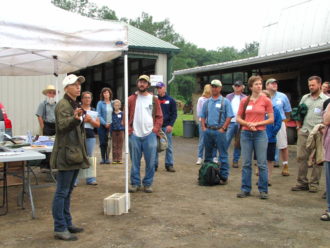Field days are a great way to share innovative ideas in sustainable agriculture with fellow farmers and ranchers, but organizing an event can be time consuming, especially if you have limited experience. This farmer field day toolkit can take some of the pressure off—it provides tips and tools on key aspects of event planning.
Download and Share this Toolkit
Want to share the toolkit at a workshop or other event? Download it as a 16-page PDF.
What is a Field Day?
Field days are educational events hosted by a producer or an educator and held on-farm or on-ranch. The events usually include demonstrations of specific management practices and equipment and/or highlight research methods and results. Audiences can include fellow producers, ag professionals, students, community members and the media. The field day can include presentations, posters, materials and walks through the fields.
Why Host a Field Day?
Example isn't another way to teach, it's the only way to teach. - Albert Einstein
Hosting a field day gives you a rewarding opportunity to showcase your hard work and achievements—the best practices for sustainability you have learned, in-field experiments, conservation efforts, ways to increase yields and profits, and more. Farmer-to-farmer education may be the best use of time to increase the sustainability of your community.
During a field day, members of your community will have a chance to learn what you grow, potentially increasing your market and brand recognition.
Recipients of SARE grants have committed to conducting broad outreach about their funded project. The expectation is that research results get into the hands of fellow producers and ag professionals quickly. Producers' most preferred ways of learning new methods and practices are through hands-on activities and on-farm demonstrations. A field day encourages peer-to-peer learning and highlights real-world practices that are successful.
The project’s results may inspire others to make similar changes and try new practices.
When planning a field day, consider partnering with organizations that share interests. This could include NRCS, conservation districts, and local Extension staff. Farm bureaus and other farmer organizations are also logical partners. Partnering may give you access to additional funding, publicity and logistical support.
For educators: If you're collaborating with producers to host farm tours or workshops, get tips on how to be respectful of your host's time and operation in the Northeast SARE Summer Tour Etiquette guide.
The information here can be used by anybody interested in hosting a field day, whether you are a SARE grantee or not.
How to Host a Field Day
Leave plenty of time to plan and organize! Take a look at the tips, tools and resources assembled here to help guarantee a successful event. Click on the following sections for more information:
Consider these ways SARE can help you advertise your field day or share the results of your work.
Share with SARE
Send us a message through our national and regional social media pages and we can help promote your event, research findings and videos or other materials you have produced through your SARE-funded project.
Contact national or regional communications staff to explore further outreach assistance, such as identifying appropriate media contacts.
